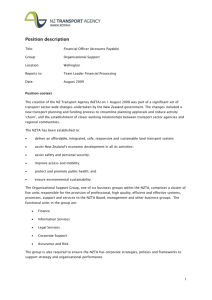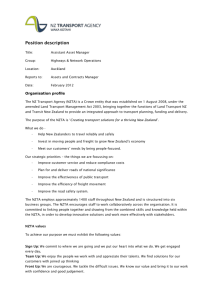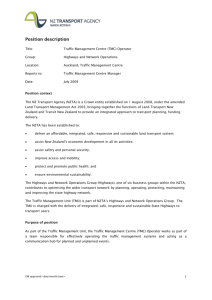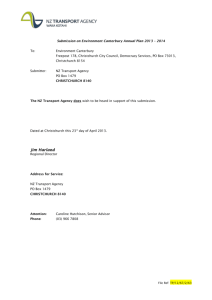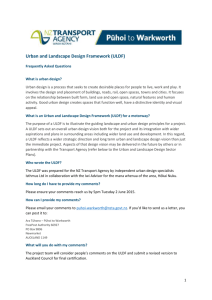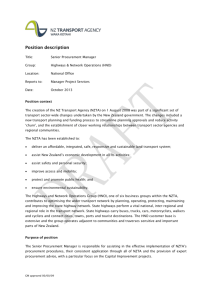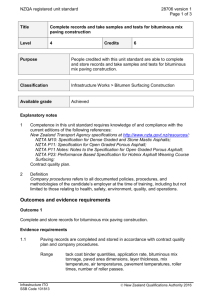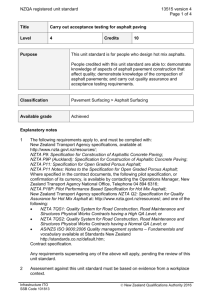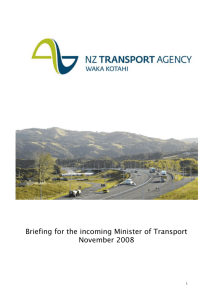2011/050 - Asset Manager
advertisement
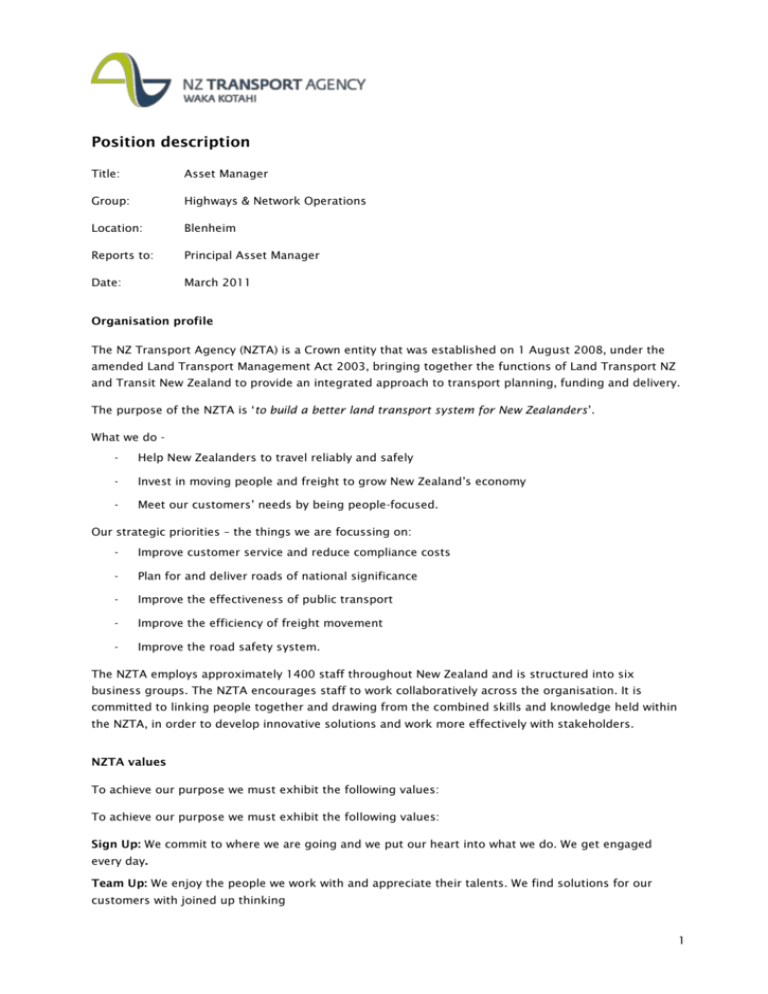
Position description Title: Asset Manager Group: Highways & Network Operations Location: Blenheim Reports to: Principal Asset Manager Date: March 2011 Organisation profile The NZ Transport Agency (NZTA) is a Crown entity that was established on 1 August 2008, under the amended Land Transport Management Act 2003, bringing together the functions of Land Transport NZ and Transit New Zealand to provide an integrated approach to transport planning, funding and delivery. The purpose of the NZTA is ‘to build a better land transport system for New Zealanders’. What we do - Help New Zealanders to travel reliably and safely - Invest in moving people and freight to grow New Zealand’s economy - Meet our customers’ needs by being people-focused. Our strategic priorities – the things we are focussing on: - Improve customer service and reduce compliance costs - Plan for and deliver roads of national significance - Improve the effectiveness of public transport - Improve the efficiency of freight movement - Improve the road safety system. The NZTA employs approximately 1400 staff throughout New Zealand and is structured into six business groups. The NZTA encourages staff to work collaboratively across the organisation. It is committed to linking people together and drawing from the combined skills and knowledge held within the NZTA, in order to develop innovative solutions and work more effectively with stakeholders. NZTA values To achieve our purpose we must exhibit the following values: To achieve our purpose we must exhibit the following values: Sign Up: We commit to where we are going and we put our heart into what we do. We get engaged every day. Team Up: We enjoy the people we work with and appreciate their talents. We find solutions for our customers with joined up thinking 1 Front Up: We are courageous. We tackle the difficult issues. We know our value and bring it to our work with confidence and good judgement.…resulting in a great place to work as a high performing, innovative organisation. Business Group Background - Highways & Network Operations The Highways & Network Operations Group (Highways), one of six business groups within the NZTA, contributes to optimising the wider transport network by planning, operating, protecting, maintaining and improving the state highway network. The Group works closely with other parts of the business to ensure the strategic priorities are achieved. State highways perform a vital national, inter-regional and regional role in the transport network. State highways carry buses, trucks, cars, motorcyclists, walkers and cyclists and connect cities, towns, ports and tourist destinations. The Highways customer base is extensive and is focussed predominately on users of the SH network. The Group operates adjacent to communities and traverses sensitive and important parts of New Zealand. The priorities for Highways are to: Improve its customer service, particularly with road users but also with suppliers, neighbours and key stakeholders Undertake all activities on the basis of operating and improving a national network Develop staff so that decision making can be devolved low into the Highways structure and that staff are trained and competent in collegial decision making Contribute to the development of the Organisational Development strategy and implement its intent over the Group/Business Unit and evidence this by measurement. Purpose of position The Asset Manager works as part of a team within Marlborough Roads to provide assurance that the operation and maintenance of the State Highway network, and management of other selected improvement projects, contributes to the NZ Transport Agency’s (NZTA) objective of delivering an integrated, safe, responsive and sustainable State Highway network in the region. The Asset Manager will also work with the Senior Asset Manager to manage the local roading network programmes as part of the Local Roads Asset Management Agreement (LRAMA) with the Marlborough District Council. Key accountabilities – general Team Contribution Demonstrates support for all the NZTA initiatives and organisational development activities, modelling expected behaviours to managers and other staff Works in a manner that reflects a clear alignment with the values and expectations of the NZTA staff and works to understand and resolve issues that may be in conflict with these values and/or expectations Actively supports an organisational culture based on high quality, innovation, responsiveness, excellent communication and continuous improvement. Relationship management Engages effectively with internal experts/staff across the NZTA so that the best information is 2 available for decision-making, policy development, planning, resource and risk management, operations and service delivery to our Minister and the public Actively manages internal client expectations and maintains timeliness of delivery including meeting service level agreements Stakeholder management Establishes and maintains professional relationships with providers of land transport services, local and central government transport sector agencies, other State agencies, the private sector, interest groups, the public as appropriate Attends meetings with key internal and external stakeholders to address specific issues and generate solutions, and has the ability to influence thinking and decisions that are consistent with the NZTA strategic direction Provides meaningful and timely communication to the sector so that stakeholders understand their requirements in relation to the Government transport sector objectives. Risk and issue management Escalates any significant risks and issues to their manager in a timely way Ensures a comprehensive risk management approach to the way the business is managed on a day to day basis. Identifies threats to SH Plan, business and the NZTA so that risks within their area of responsibility are managed, mitigated or minimised Identifies and takes advantage of opportunities so that there is continuous improvement in business processes and greater value is delivered to customers and stakeholders. Customer service Develops a customer service ethos that focuses on the provision of high quality, proactive and timely service, support and advice, which is aligned to the NZTA’s needs and strategies. Actively manages key customer segments of road users, key stakeholders, neighbours and suppliers by: encouraging and promoting dialogue and collaboration with road user groups such as Automobile Association, Road Transport Federation, bus operators, cycling interest groups so that they play a part in assisting with the setting of priorities, standards and urban design developing and maintaining a working relationship with all suppliers so that they have forward visibility of our programme and can openly discuss issues with the NZTA and see the NZTA as a premier client ensuring we are open, honest and available to all our neighbours so that they can advise us of issues and that they can, through engagement, assist us in finding the best solutions to our transport problems. Health and safety Takes responsibility for own health and safety Ensures own actions keep self and others safe 3 Identifies, reports and assists to eliminate hazards in their own workplace Participates in local workplace safety management practices. Self development Takes responsibility for personal development and continually develops their own professional expertise. Key accountabilities - specific Travel Time Reliability Assists in the response to incidents in order to reduce delays Sustainable Asset Participates in drive over audits of the network. Assists staff participation in Network Safety Coordination projects and Crash Reduction studies. Participates in safety audits on worksites, the network and various projects and activities. Scopes activities and projects for prioritisation and inclusion in work programmes. Assists with utility corridor management and as required may be appointed as Corridor Manager in terms of the Infrastructure Act. Assists in delivery of approved programmes. Assists in financial management by running reports and manipulating spreadsheets as required. Assists in the preparation of reports gathering and manipulating data, and preparing text and visual representations. Establishes and maintains relationships with key stakeholders by communicating with them in a polite and professional way at all times. Responds to enquiries and requests for service in a timely and professional manner. Participates in technical audits in the region and in other networks and regions. Contributes to the environmental goals of NZTA’s Environmental Plan. Assists in the annual update of bylaws. Ensures the data in these inventories is accurate and up to date. Under supervision, provides engineering input into resource consent applications to protect the operation and maintenance of the state highway network. Ensures work is completed in accordance with the conditions of the consent which should reflect NZTA policies and standards, before being accepted into the network. Provides administrative support for the management of Limited Access Requirements on appropriate state highways Ensures deeds and licenses are in place to enable work to be carried out within the state highway reserve, safely and with minimum disruption to road users 4 Assists in ensuring all reinstatement is completed to NZTA policies and standards. Network Improvement Assists in Identifying improvement opportunities for strategic studies and capital works. Participates in the formulation and improvement of local and national policies and procedures. Construction Excellence Assists in delivering projects on time and to standard. Financial Dimensions Not applicable Committee / Steering Group / Team memberships Business/Technical/Operational Teams – responsible for contributing to specialised teams and groups ensuring business procedures are reviewed, updated and improved as required to meet business need. Key relationships Internal Senior Asset Manager Principal Asset Manager Marlborough Roads Manager Marlborough Roads Safety Engineer Regional staff Other NZTA managers and staff External Other Government Departments / agencies Marlborough District Council staff and elected members Consultants and contractors Members of the community Territorial / Regional Authorities NZ Police Iwi Equipment Suppliers 5 Person specification Education and training A four year Bachelor of Engineering (BE or equivalent) or a degree that is benchmarked to the Washington Accord is preferred although a person with equivalent experience will be considered. A current and valid New Zealand Driver’s Licence (or equivalent) is required for this position. Knowledge and experience Experience in managing a state highway network maintenance contract at a regional level and an indepth knowledge of asset management as it relates to the roading industry. Understanding of the principles of traffic operations and the systems that can be implemented to impact traffic flow. Experience in delivering safety programmes on the network. Knowledge and experience in dealing with the management of multiple issues in a sensitive and political environment in a systematic way. An understanding of the Land Transport Management Act, Resource Management Act and Local Government Act, and a working knowledge of and land use planning processes is required. Personal attributes Demonstrates excellent problem solving skills and the ability to apply an analytical approach to arrive at a solution that reflects best practice. Demonstrates exceptional oral and written communication skills and a strong ability to collaborate with others outside the transport sector, particularly in the various communication channels available. Ability to think strategically and be innovative. Possesses the creditability and confidence to command the respect of their peers, enabling the establishment and management of key internal relationships, and identified stakeholder groups Good computer skills and knowledge of current industry software packages as well as a proven ability to use these systems to analyse data are essential. Actively demonstrates, promotes and models desired organisational behaviours and values Displays strong interpersonal skills Experience in building and fostering relationships Displays a strong customer service ethos Possesses a strong achievement/delivery focus – sets high standards including accuracy and attention to detail, meets deadlines etc Promotes a high quality climate of innovation, collaboration, change and adaptation in own area 6 Actively looks for opportunities to improve services and support organisational change Displays strong team skills, contributing to team success Takes accountability for the responsibilities of the position and own actions. Competencies – technical competence standards The twelve elements of the competence standard for Professional Engineers are set out below: Element One - Knowledge Comprehend and apply knowledge of the accepted principles underpinning widely applied good practice in professional engineering (Washington Accord degree level) Element Two – Local Knowledge Comprehend and apply knowledge of the accepted principles underpinning good practice for professional engineering that is specific to the jurisdiction in which he/she practices (NZ) Element Three – Analyse Problems Define, investigate and analyse complex engineering problems in accordance with good practice for professional engineering Element Four – Design or Develop Solutions Design or develop solutions to complex engineering problems in accordance with good practice for professional engineering Element Five – Decision Making Be responsible for making decisions on part or all of one or more complex engineering activities Element Six – Management Manage part or all of one or more complex engineering activities in accordance with good engineering management practice Element Seven – Risk Management Identify, assess and manage engineering risk (in the context of complex engineering problems) Element Eight – Ethical Conduct Conduct engineering activities to an ethical standard at least equivalent to the relevant code of ethical conduct Element Nine – Recognise Foreseeable Effects Recognise the reasonably foreseeable social, cultural and environmental effects of professional engineering activities generally Element Ten – Communication Communicate clearly with other engineers and others that he or she is likely to deal with in the course of his or her professional engineering activities 7 Element Eleven – Maintain Currency Maintain the currency of his or her engineering knowledge and skills Element Twelve – Judgement Exercise sound professional engineering judgement 8
